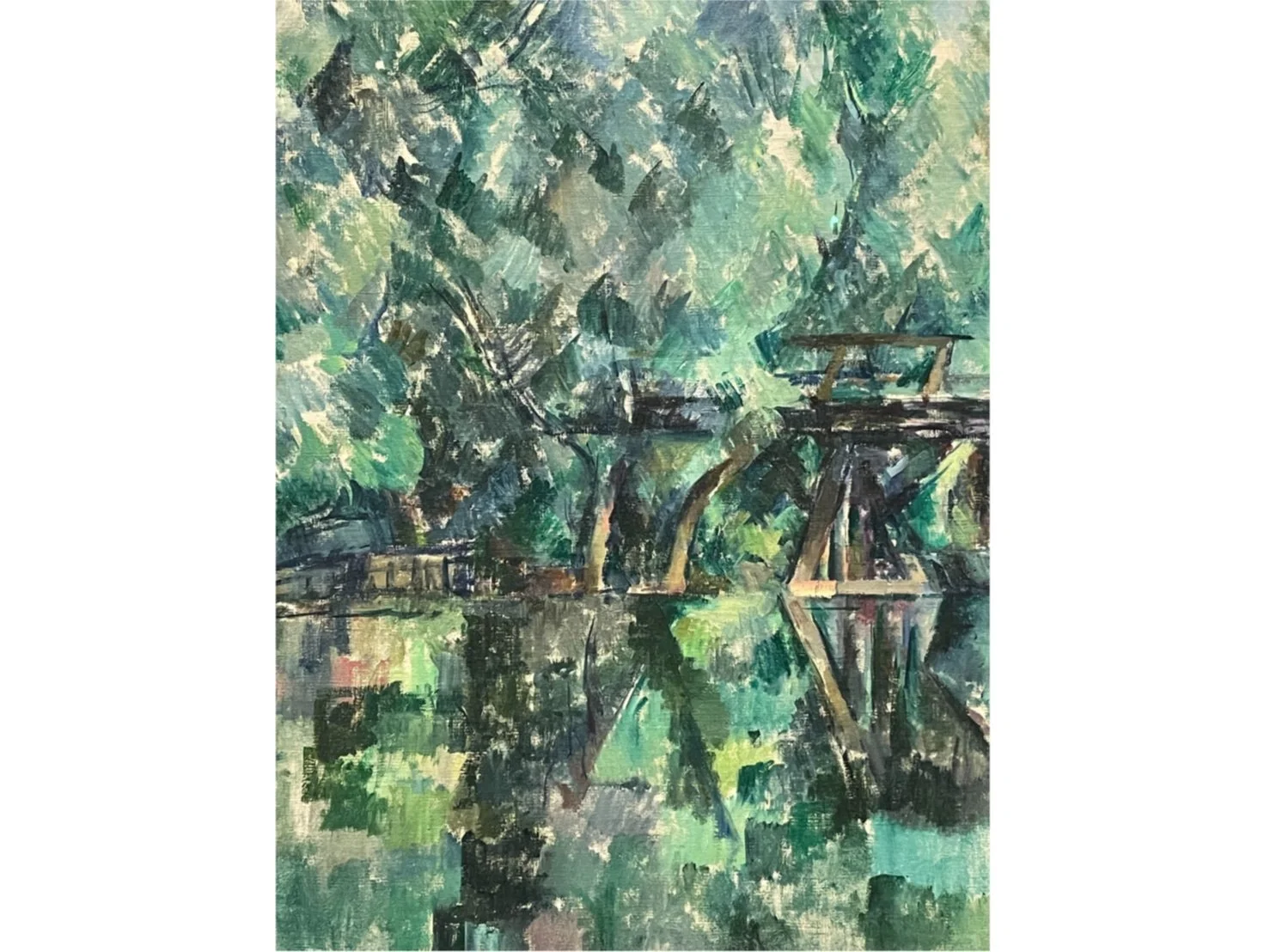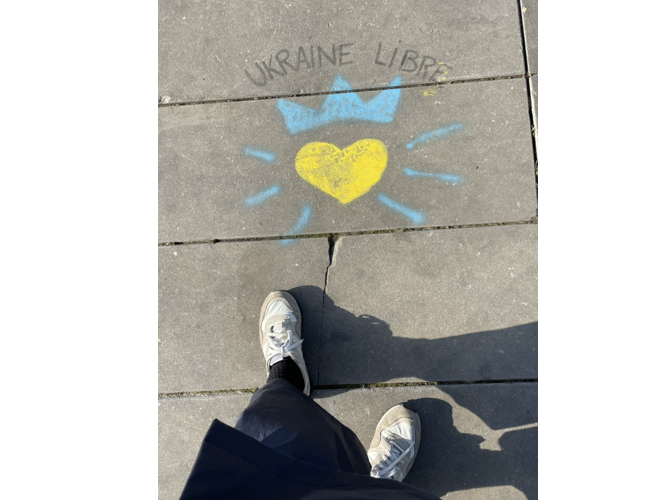Two years have passed since then. I am here in Paris again.
The once deserted streets came back to life.
Children are chatting and running around in the cafés.
People have taken off their masks and are greeting each other with a smile.
I came back to see scenes like these.
On the eastbound flight, we flew near the Arctic Circle, and it took 18 hours to get here.
On February 24, the world was shaken to the core.
Russia attacked Ukraine.
Houses were bombed and tanks moved into the cities. Young Ukrainian men were told to separate from their families and join the military.
When one young girl asked her father where he was going, he answered in a choked voice, “I’m going off to war.”
It’s hard to believe that the day has come when people have to say things like this.
Economic sanctions are being imposed on Russia. Japanese and European planes can no longer pass through Russian airspace.
The day before I was due to leave, my flight from Narita to Paris was cancelled. I switched to an eastbound flight via London. One way or another I was determined to get here.
A girl had the worried look of an aged mother, as if we were headed for the battlefield. I drew a map of the world and explained our flight route. I told her everything was going to be okay.
As we were flying near the Arctic Circle, one of the passengers told me I could see an aurora.
Outside the window, the sky was full of stars. Cygnus the Swan was flying right there in front of me. My plane flew directly under the constellation.
We finally arrived in Paris. The magnolias were in full bloom.
Two days after I arrived in Paris, the government scrapped the anti-virus measures.
When I opened the window, I could hear the music of the city: people talking, children laughing, cars beeping, accordionists playing on the street. All of the applause for the health-care workers had ended.
The lonely scene outside my window had turned into a peaceful landscape painting.
A country 2,000 kilometers to the east is now being devastated by war.
A Russian woman living in Kyiv phoned her mother. She told her Russia was bombing Ukraine. Her mother was outraged, “How dare you lie to your mother?” The woman broke down in tears at the thought that her own mother didn’t believe her.
My mother, who watches the news everyday in Japan, told me this story over the phone.
President Zelenksy made a speech on March 24.
The distance between Japan and Ukraine is 8,193 kilometers, but when it comes to the desire for peace, there isn’t even a millimeter between the two countries. Ukraine faces the threat of nuclear destruction. Naturally, the people who have been forced to leave want nothing more than to return to their homes.
It was no different for the people of Hiroshima, Nagasaki or Fukushima.
This is what I heard.
Paris seems to have calmed down. The war is in some faraway place – not here. Half of me feels relieved to be in this state of tranquility. The other half regrets feeling relieved.
I bury my conflicting emotions and go out for a walk to Place de la Bastille at night. There’s a column there commemorating the French Revolution that is topped with the Spirit of Freedom. When I glance up at it, the statue is bathed in blue and yellow.
The Place de la République. A demonstration was held here seven years ago after the 2015 terrorist attacks. Every world leader spoke out against these violent acts that imperiled ordinary people. The first leader to extend his condolences to President Hollande was Putin.
Marianne, the French symbol of liberty, stands silently against the blue sky.
An exhibition of works from the Morozov Collection is underway at the Fondation Louis Vuitton. The Russian collector Ivan Morozov amassed a host of modern art masterpieces in Paris at the turn of the century. This “homecoming” show was so amazing when I saw it last October that I was left speechless. It was supposed to end on March 6, but it’s still going.
Why?
The Russian Revolution broke out in 1917. The new government seized Morozov’s house, which was filled with all of these masterpieces.
Morozov defected to Switzerland. He died there three years later without ever returning to his homeland. The collection, now state-owned, is housed in the Pushkin Museum and the Hermitage. It was never returned to the Morozov family or to France.
The collection, divided across two cities, has never been unified again. Moving the works would be extraordinarily expensive in terms of transportation and insurance, and it would also be risky. But France accepted these conditions in an effort to bring all of the works back together in their homeland.
Separated for over 100 years, the works were successfully reunited in Paris.
Cézanne, Van Gogh, Gauguin, Picasso. My friends, my big brothers! I finally had a chance to meet you in your dear old hometown.
Last fall, the moment I set foot in the exhibition venue, the paintings uttered a cry of joy. The entire crowd of masked viewers witnessed this breathtaking and miraculous reunion.
Five months later.
The venue fell silent again.
Something just occurred to me.
After the exhibition ended, were all of the works returned to Russia? Of course they were. After all, they belong to Russia. But originally they didn’t. The country seized the privately owned collection.
After France had achieved this homecoming, Russia began waging war. Should the paintings be returned to Russia under these circumstances?
At the beginning of the exhibition catalogue, there was a message to the viewers:
To all of my dear French friends,
It is a great joy for me to see these masterpieces by French painters to return and be reunited in Paris.
Vladimir Putin
2020
An anti-war demonstration was staged in front of Paris City Hall.
Paris-resident Ukrainians were shouting: Give us back our homeland! Give us back our homeland!
The silent voices of the artworks came back to life.
“We returned to our homeland after a handshake between France and Russia two years ago. But now that these once united hands have been divided, where are we to go?”
They are things that all of us have.
They are things that none of us can take with us.
They are things that should never be violated.
Life.
Liberty.
A homeland.
April 3. The exhibition is over.
President Zelensky is making a speech.
We must do everything in our power to ensure that the cruel wars that have occurred throughout history will never happen again.
I can hear the voices of the Ukrainian people and the homesick voices of Morozov’s artworks.
They are calling out the names of their hometowns.
Translated by Christopher Stephens
© 2022 Maha Harada






